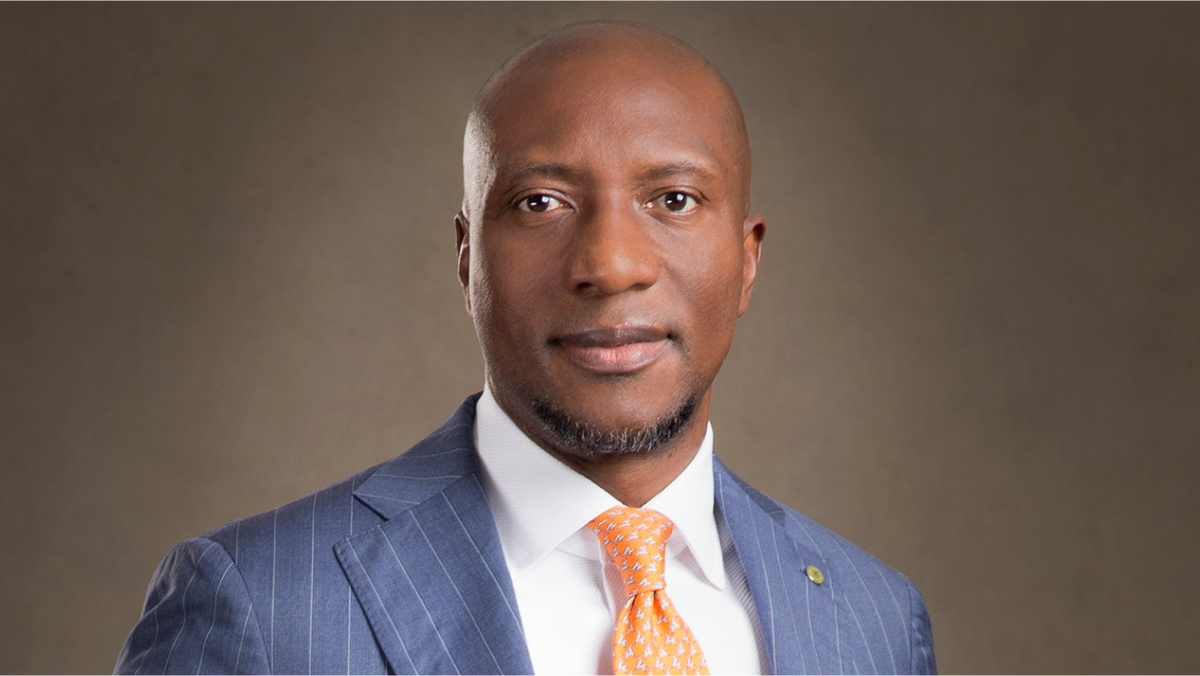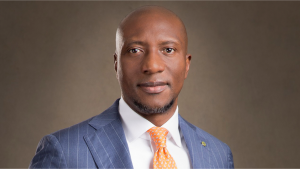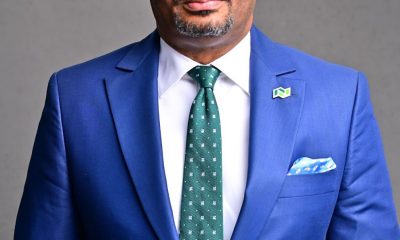Business
Oscar Onyema under fire, as lawsuit, investment loss, poor earnings trail NGX Group

Oscar Onyema under fire, as lawsuit, investment loss, poor earnings trail NGX Group
The Nigerian Exchange Group (NGX) seems to be falling like a pack of cards under Oscar Onyema, and his 11 years leading the company is being called to question over alleged poor financial management and lack of value creation for shareholders.
For 10 years, Oscar led the Nigerian Stock Exchange between April 2011 to April 2021 as the Chief Executive Officer, however, when the Exchange completed its demutualisation on March 10, 2021, transitioning into the Nigerian Exchange Group, he became the GMD/CEO, a position he has held in the last one year and six months.
The demutualisation of the Nigerian Stock Exchange enable the public own shares in the entity that became NGX Group, after the exchange was separated to become a subsidiary.
After directing the affairs of NSE with little scrutiny for over 10 years, Oscar’s handling of the firm as a public entity in less than two years has led to some shareholders asking for the 54-year-old’s head on the chopping block, with axe in hand.
Since March 2021, when the Exchange went public, the board and management haven’t proposed or offered its over 400 shareholders dividends, which means investors that invested in NGX Group haven’t received necessary value for their investment.
However, a year before, the directors of NGX Group awarded themselves over 200.41 million ordinary shares, worth N5.57 billion (when pegged to the open listing price; N27.90kobo per share) as deferred bonus plan (DBP) to keep them in the company for a specified period.
Aside what the shares gifted to themselves at the 2020 Annual General Meeting, they also proposed that the sum of N126 million be approved by shareholders as payment to the Non-Executive Directors of the Nigerian Stock Exchange.
All these stock and cash rewards were made despite Onyema and other directors sitting on a poor financial performance in the same year 2020, suffering N93.96 million operating loss. Despite escaping from the grip of loss in FY 2021, with N281.84 million, the management spent 56.07% (N3.23 billion) of its N5.77 billion revenue on about 200 personnel within 12 months last year – but total expenses, N6.51 billion, surpassed the turnover.
Investors losing money and confidence in Onyema-led NGX Group management
With the management’s inability to curb expenses, spending more than it was generating, investors confidence in NGX Group is falling, reason the firm’s share is down to N19.4kobo as at September 2022, far below the N27.9kobo price it began listing with.
This means -30.4% of shareholders investment has been wiped off due to low interest for NGX Group share, which indicates investors in the stock market are snubbing the firm and taking their money to more profitable equities, as they have little or no confidence in the Onyema-led NGX Group.
Comparing NGX Group’s performance with the larger stock market, Ripples Nigeria analysis showed that the company was in fact trading in the opposite direction to the former, maintaining a bearish run of -30.4% decline in share value since it listed on October 15, 2021, in contrast to the 19.3% growth recorded by the Nigerian Stock Exchange within same period.
Investors ignoring NGX Group is understandable, considering the board hasn’t proposed dividend as earlier stated, which is a way shareholders get value for their investment, but instead, the firm is rewarding the directors for slow growth in revenue burdened by expenses.
Despite struggling to cure its expense headache, the management is also trying to add debt burden of N15 billion to its financial issue, a decision that has led some shareholders; Olayinka Olajuwon and Bamidele Ibironke, amongst others, to lawyer up against Onyema and the NGX Group.
Shareholders threaten lawsuit over impending resolutions by NGX management
In a document dated September 14, 2022, obtained by Ripples Nigeria, Olajuwon and Ibironke, representing a class of shareholders of NGX Group, through their solicitors, S.O.&C Legal, demanded that the management halt some resolutions it plans to ask for passage through proxy on September 30, 2022.
Part of the resolutions includes; to raise additional capital of N35 billion, with N15 billion of the amount expected to come from debt, N20 billion from the equity (stock).
The shareholders, through their counsel, are questioning why the management wants to borrow N15 billion when it has unissued shares, from which the sum can be raised. They also argue that NGX Group remains viable, so the loan is unwarranted.
NGX Group’s decision to borrow N15 billion raises eyebrow, as Ripples Nigeria notes that if the company was in dire need of capital, why did the management award itself the 200.41 million ordinary shares, worth N5.57 billion, which is a gift that would be collected in cash at a specified period, and also paid Non-Executive Directors N126 million.
The aggrieved shareholders also stated that the company hasn’t given evidence as to reason for seeking new capital. They also complained of the NGX Group abusing the right of shareholders by imposing proxy on investors to vote on the resolutions, whereas, shareholders are backed by law to make the decisions themselves.
They accuse the management of lying by using COVID-19 measures to defend reason proxy is preferred at the Annual General Meeting, instead of physical presence of shareholders. The solicitor said the COVID-19 measure, which bar gathering, had been lifted by the government.
They threaten to take the case to court if the management of NGX Group doesn’t halt the proposed meeting within seven days, starting from the day the letter was dated – the seven days intimation ended on September 21, 2022.
It described the Notice for resolutions as “ill-advised, fraudulent and fraught with illegalities and amounts to egregious abuse of privilege by the board of directors. The Notice is contrary to the Companies and Allied Matters Act (CAMA), Investment and Securities Act and other relevant capital market statutes and regulations. Also, the Notice and resolutions are contrary to the Board Charter of the Company:”
The solicitors also said, “TAKE NOTICE that if within 7 (seven) days of your receipt of this letter, we do not receive your formal withdrawal of the said notice, our Clients shall consider themselves to be at liberty to initiate necessary legal steps to seek redress, including injunctive orders to restrain holding of the meeting and/or set aside all illegal acts of the Company. In the event that this is so, this letter shall represent the requisite pre-action protocol. Do be advised accordingly.”
Read what shareholders told Onyema and his team
· Resolution 8(i) and (ii) in particular are contrary to section 142(2) of the Companies and Allied Matters Act 2020, under which the allotment of any newly issued share in a company is subject to the pre-emptive rights of a shareholder. The section DOES NOT give any power to any board to allot any share otherwise as stated in the section;
· By definition “capital” of a company refers to the total assets of a business or total amount or value of its stock, which in turn is partly a function of a company’s asset worth. It is unthinkable how incurring a debt burden of N15 billion for the company will translate to raising capital for the company that remains a viable, highly regarded entity in the capital market with unissued shares from which to raise capital;
· Section 340 of SEC Regulations provides, among others, that a public company seeking to offer securities by private placement must show evidence of dire need of fresh funds and shall satisfy the Commission that the private placement remains the only viable alternative…” No evidence has yet been put forward to show compliance with this provision;
· It is now public knowledge that directors of the Company recently paid themselves whopping sums of money under the guise of allowances and other perks of office. Evidently, this would not have been so, if the company was in dire need of funds. Meanwhile, no resolution has been proposed to authorise payment of any dividend to shareholders,
· The unissued shares of the company denote availability of shares for purchase for the purpose of raising capital as is the standard case. However, rather than offer the shares for sale, the board of directors seek to cancel the unissued shares and issue new shares to be distributed in breach of section 142(2) of CAMA;
· The right to appoint a proxy to attend and vote instead of him and the proxy need not be a member of the company… is a personal right that section 242(4) of CAMA guarantees to a shareholder. Therefore, it is illegal and amounts to violation of that right to attempt to choose or foist any proxy (named or unnamed) on any shareholder. By law, that right belongs fully to the shareholder. It is not shared with the company;
· The claim that the Corporate Affairs Commission (CAC), Lagos State Government and Federal Government COVID-1 9 Guidelines are the bases for insisting that shareholders shall only attend by proxy, is palpably false. There is no COVID-19 guideline that justifies insistence on shareholders attending AGM by prox(ies) only, let alone the selected proxies;
· The Company is a PLC. The Guideline issued by the Presidential Steering Committee on COVID-1 9 on 2nd April 2022, provides in relation to public gatherings that: “Limitation on number of persons attending informal and formal festivity events including weddings, conferences, congresses, office parties, seminars, end of year events has been lifted”, and
· Even if (which is not admitted) any CAC guideline permits holding a meeting by proxy, whether or not general, by proxy, such guideline is illegal and CANNOT stand in the face of the clear provisions of CAMA. CAC cannot by regulation remove a right conferred by statute.
Business
Nigeria’s Inflation Drops to 15.10% as NBS Reports Deflationary Trend

Nigeria’s headline inflation rate declined to 15.10 per cent in January 2026, marking a significant drop from 27.61 per cent recorded in January 2025, according to the latest Consumer Price Index (CPI) report released by the National Bureau of Statistics.
The report also showed that month-on-month inflation recorded a deflationary trend of –2.88 per cent, representing a 3.42 percentage-point decrease compared to December 2025. Analysts say the development signals easing price pressures across key sectors of the economy.
Food inflation stood at 8.89 per cent year-on-year, down from 29.63 per cent in January 2025. On a month-on-month basis, food prices declined by 6.02 per cent, reflecting lower costs in several staple commodities.
The data suggests a sustained downward trajectory in inflation over the past 12 months, pointing to improving macroeconomic stability.
The administration of President Bola Ahmed Tinubu has consistently attributed recent economic adjustments to ongoing fiscal and monetary reforms aimed at stabilising prices, boosting agricultural output, and strengthening domestic supply chains.
Economic analysts note that while the latest figures indicate progress, sustaining the downward trend will depend on continued policy discipline, exchange rate stability, and improvements in food production and distribution.
The January report provides one of the clearest indications yet that inflationary pressures, which surged in early 2025, may be moderating.
Bank
Alpha Morgan to Host 19th Economic Review Webinar

Alpha Morgan to Host 19th Economic Review Webinar
In an economy shaped by constant shifts, the edge often belongs to those with the right information.
On Wednesday, February 25, 2026, Alpha Morgan Bank will host the 19th edition of its Economic Review Webinar, a high-level thought leadership session designed to equip businesses, investors, and individuals with timely financial and economic insight.
The session, which will hold live on Zoom at 10:00am WAT and will feature economist Bismarck Rewane, who will examine the key signals influencing Nigeria’s economic direction in 2026, including policy trends, market movements, and global developments shaping the local landscape.
With a consistent track record of delivering clarity in uncertain times, the Alpha Morgan Economic Review continues to provide practical context for decision-making in a dynamic environment.
Registration for the 19th Alpha Morgan Economic Review is free and can be completed via https://bit.ly/registeramerseries19
It is a bi-monthly platform that is open to the public and is held virtually.
Visit www.alphamorganbank to know more.
Business
GTBank Launches Quick Airtime Loan at 2.95%

GTBank Launches Quick Airtime Loan at 2.95%
Guaranty Trust Bank Ltd (GTBank), the flagship banking franchise of GTCO Plc, Africa’s leading financial services group, today announced the launch of Quick Airtime Loan, an innovative digital solution that gives customers instant access to airtime when they run out of call credit and have limited funds in their bank accounts, ensuring customers can stay connected when it matters most.
In today’s always-on world, running out of airtime is more than a minor inconvenience. It can mean missed opportunities, disrupted plans, and lost connections, often at the very moment when funds are tight, and options are limited. Quick Airtime Loan was created to solve this problem, offering customers instant access to airtime on credit, directly from their bank. With Quick Airtime Loan, eligible GTBank customers can access from ₦100 and up to ₦10,000 by dialing *737*90#. Available across all major mobile networks in Nigeria, the service will soon expand to include data loans, further strengthening its proposition as a reliable on-demand platform.
For years, the airtime credit market has been dominated by Telcos, where charges for this service are at 15%. GTBank is now changing the narrative by offering a customer-centric, bank-led digital alternative priced at 2.95%. Built on transparency, convenience and affordability, Quick Airtime Loan has the potential to broaden access to airtime, deliver meaningful cost savings for millions of Nigerians, and redefine how financial services show up in everyday life, not just in banking moments.
Commenting on the product launch, Miriam Olusanya, Managing Director of Guaranty Trust Bank Ltd, said: “Quick Airtime Loan reflects GTBank’s continued focus on delivering digital solutions that are relevant, accessible, and built around real customer needs. The solution underscores the power of a connected financial ecosystem, combining GTBank’s digital reach and lending expertise with the capabilities of HabariPay to deliver a smooth, end-to-end experience. By leveraging unique strengths across the Group, we are able to accelerate innovation, strengthen execution, and deliver a more integrated customer experience across all our service channels.”
Importantly, Quick Airtime Loan highlights GTCO’s evolution as a fully diversified financial services group. Leveraging HabariPay’s Squad, the solution reinforces the Group’s ecosystem proposition by bringing together banking, payment technology, and digital channels to deliver intuitive, one-stop experiences for customers.
With this new product launch, Guaranty Trust Bank is extending its legacy of pioneering digital-first solutions that have redefined customer access to financial services across the industry, building on the proven strength of its widely adopted QuickCredit offering and the convenience of the Bank’s iconic *737# USSD Banking platform.
About Guaranty Trust Bank
Guaranty Trust Bank (GTBank) is the flagship banking franchise of GTCO Plc, a leading financial services group with a strong presence across Africa and the United Kingdom. The Bank is widely recognized for its leadership in digital banking, customer experience, and innovative financial solutions that deliver value to individuals, businesses, and communities.
About HabariPay
HabariPay is the payments fintech subsidiary of GTCO Plc, focused on enabling fast, secure, and accessible digital payments for individuals and businesses. By integrating payments and digital technology, HabariPay supports innovative services that make everyday financial interactions simpler and more seamless.
Enquiries:
GTCO
Group Corporate Communication
[email protected]
+234-1-2715227
www.gtcoplc.com
-

 celebrity radar - gossips6 months ago
celebrity radar - gossips6 months agoWhy Babangida’s Hilltop Home Became Nigeria’s Political “Mecca”
-

 society6 months ago
society6 months agoPower is a Loan, Not a Possession: The Sacred Duty of Planting People
-

 society5 months ago
society5 months agoReligion: Africa’s Oldest Weapon of Enslavement and the Forgotten Truth
-

 news6 months ago
news6 months agoTHE APPOINTMENT OF WASIU AYINDE BY THE FEDERAL GOVERNMENT AS AN AMBASSADOR SOUNDS EMBARRASSING






